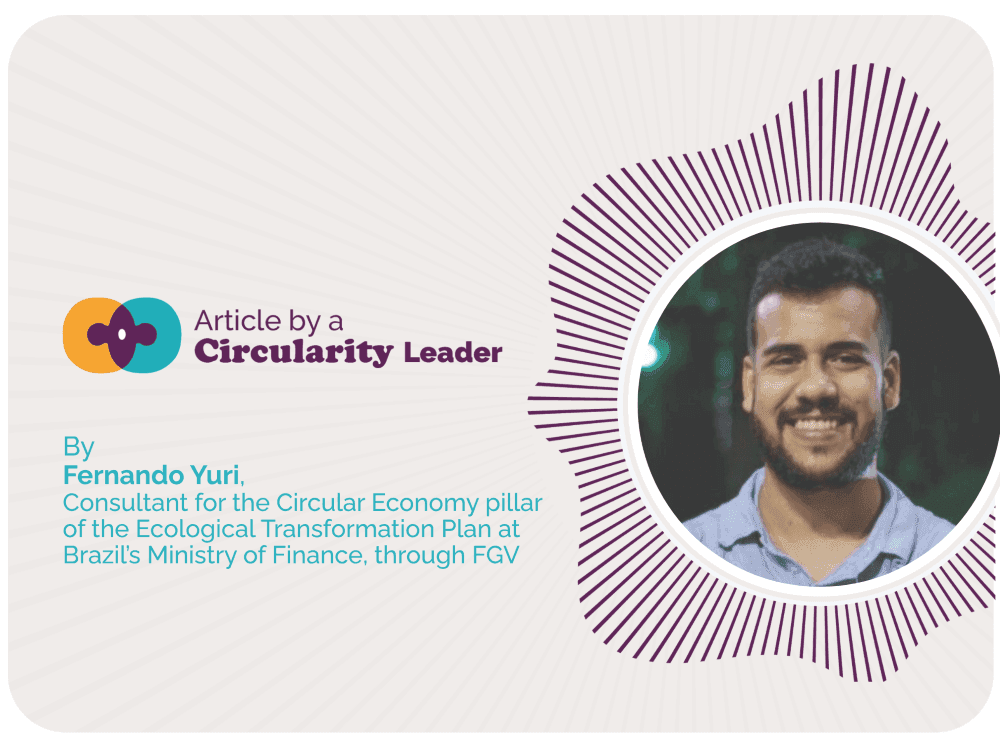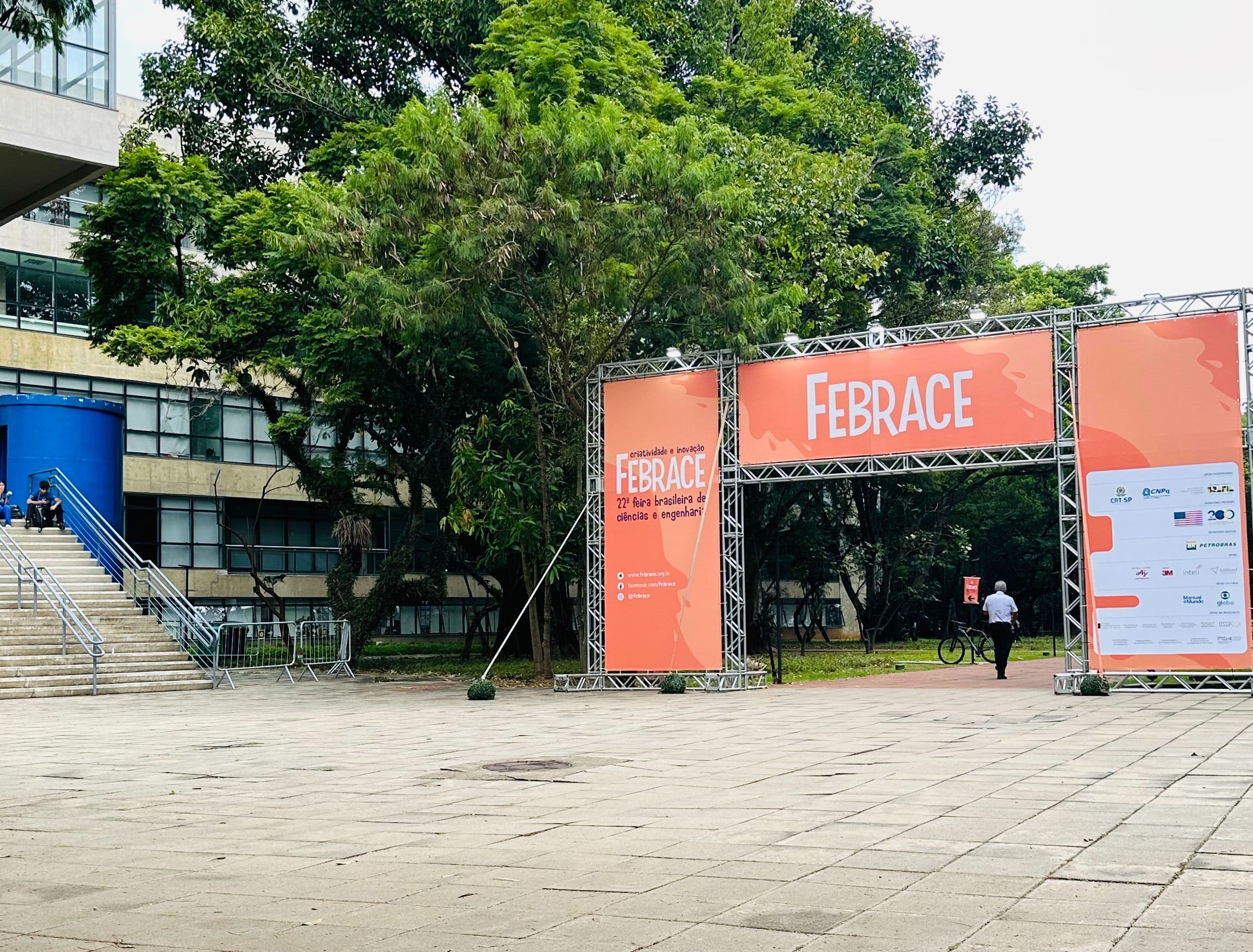
29/03/2024
Circular Economy: International Award for a World Without Waste announces winners of Febrace 2024
By Arlene Carvalho, from the Circular Movement
The Circular Movement announced the winners of the first stage of the International Award for a World Without Waste 2024 during the 22nd edition of the Brazilian Science and Engineering Fair, Febrace, in São Paulo (BR). In total, four projects were selected by the judges, including champions and honorable mentions. The award aims to find, recognize, and give visibility to projects created by students and educators that promote the construction of a world without waste through the Circular Economy.
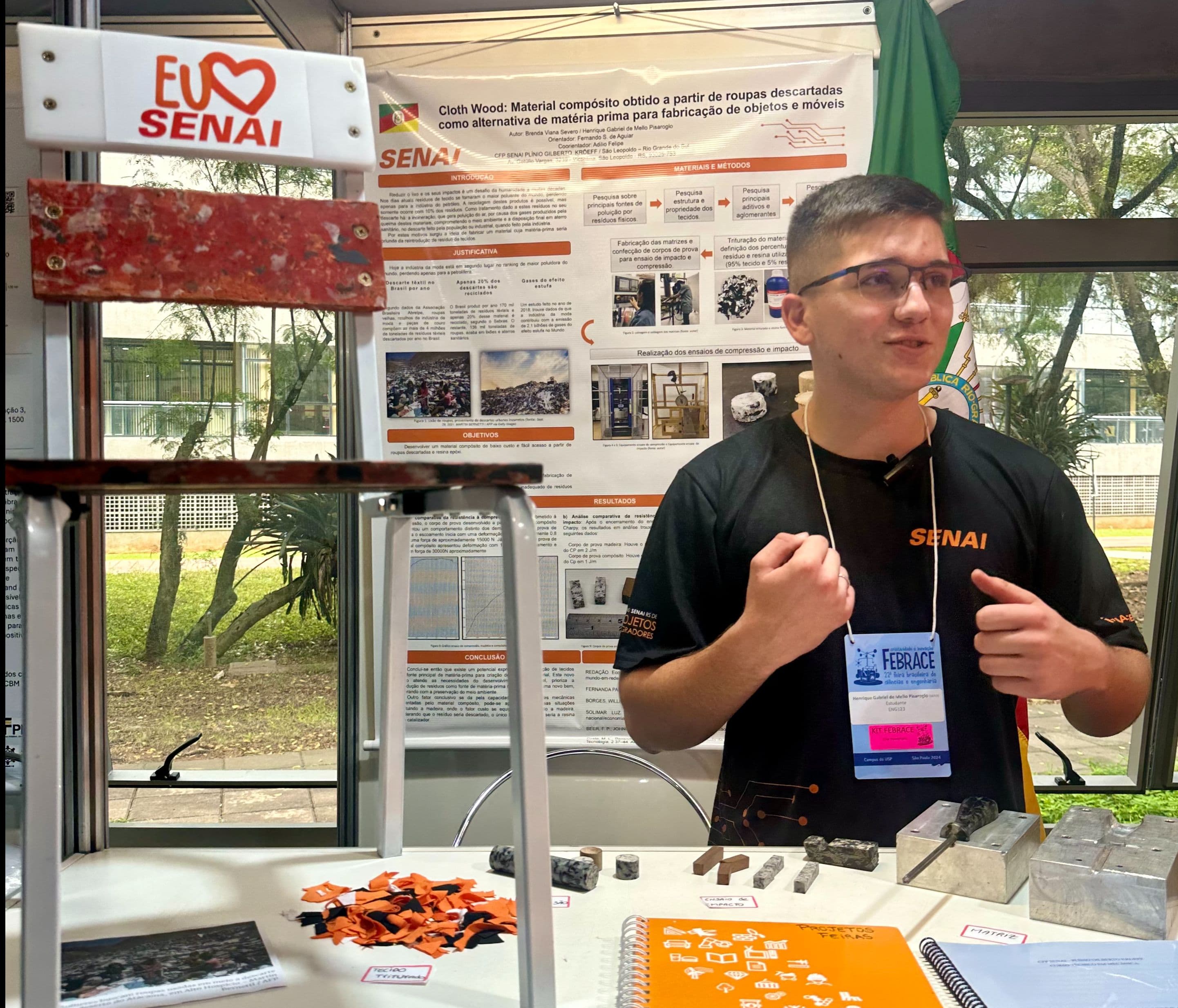
Representative of the Cloth Wood project, grand winner. Photo: Maria Carolina Stenico/Circular Movement
First place went to a group that brought together students from the Senai Institute of Innovation in Integrated Metalworking Solutions and Senai Plínio Gilberto Kroeff, both in São Leopoldo, Rio Grande do Sul, with the project "Cloth Wood: composite material obtained from discarded clothing as an alternative raw material for manufacturing objects and furniture." The initiative uses old clothes to make objects and furniture, transforming fabrics into a strong material using a special resin. This material is more resistant than wood and can be used in many things, both at home and in industry. The project is innovative and helps reuse different types of textile waste, making the use of these resources smarter and more sustainable.
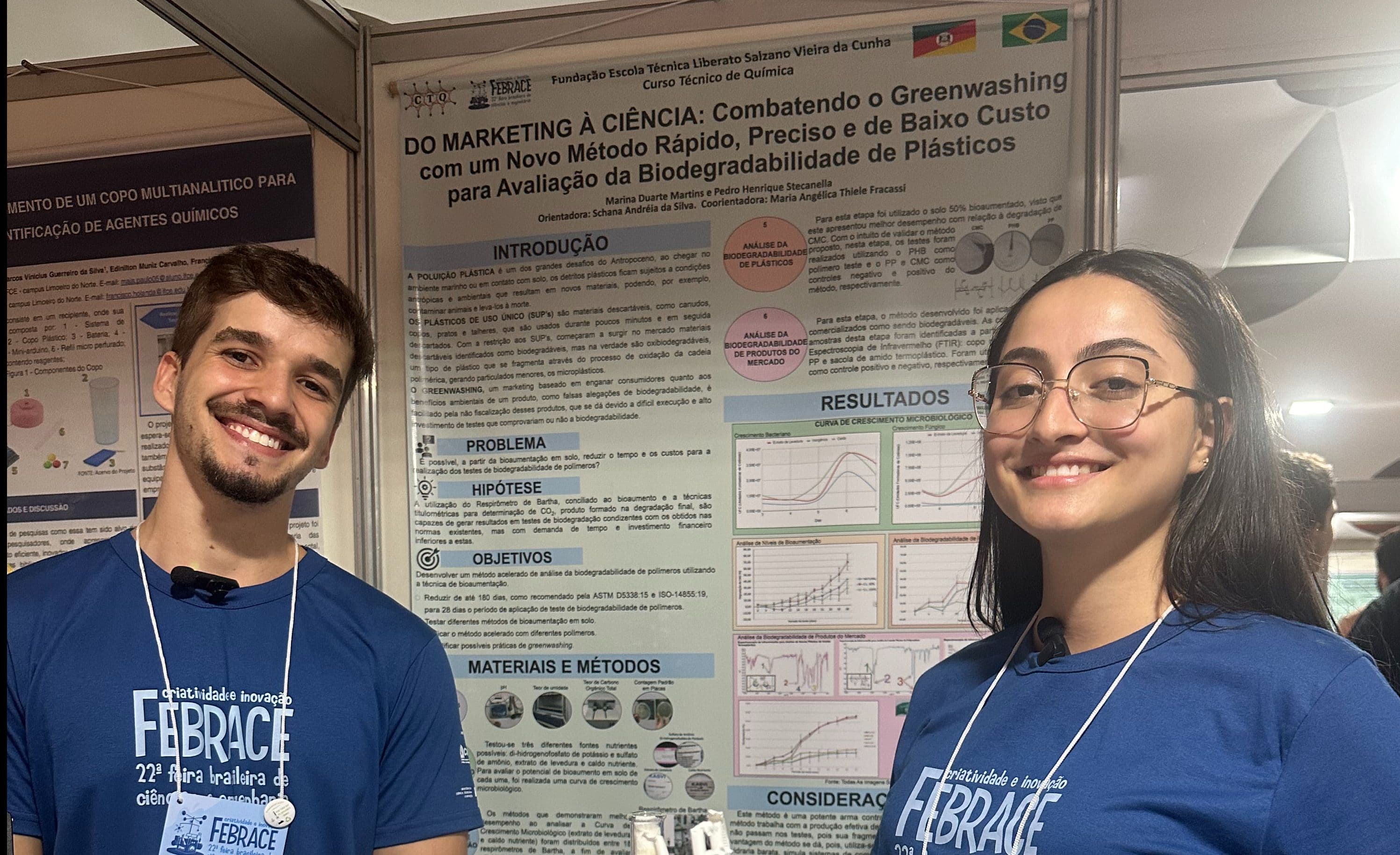
The second-place winner also came from Rio Grande do Sul. Photo: Maria Carolina Stenico/Circular Movement.
Second place also came from Rio Grande do Sul, but from the city of Novo Hamburgo, with students from the Liberato Salzano Vieira da Cunha Foundation Technical School. With the project "From Marketing to Science: Combating Greenwashing with a new method for assessing the biodegradability of plastics," they propose a faster and cheaper way to test biodegradation, using soil microorganisms to accelerate results from 180 to 28 days. This method also identifies truly biodegradable products, helping to combat greenwashing - a deceptive practice in which a company, organization, or individual tries to present itself as more environmentally responsible than it really is - and promoting sustainable practices in the industry and among consumers.
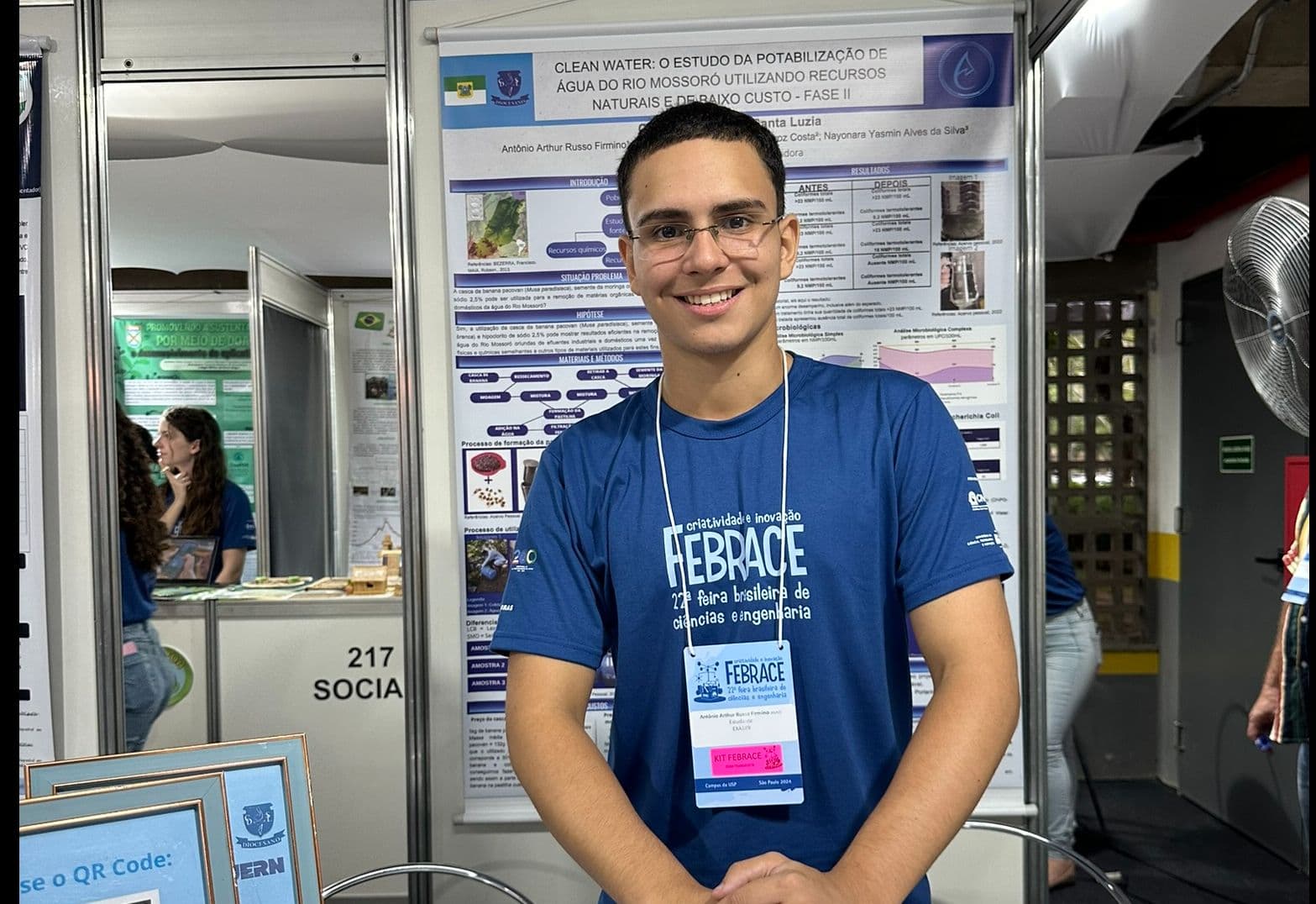
Our third place came from Mossoró, RN. Photo: Maria Carolina Stenico/Circular Movement.
It is in Northeast Brazil where we find our third-place winner. Directly from the Diocesan School Santa Luzia, in Mossoró, Rio Grande do Norte, the students from the project "Clean Water: The study of water purification from the Mossoró River using natural and low-cost resources - phase II," aim to improve water purification techniques that have already been developed. Faced with the growing challenge of Mossoró River contamination, caused by industrial, domestic, and hospital effluents, these students are dedicated to finding affordable and effective solutions to make the river water safe for human consumption and daily use. The work contributes not only to improving the living conditions of riverside communities but also to preserving the local environment and raising awareness about the importance of clean and potable water.
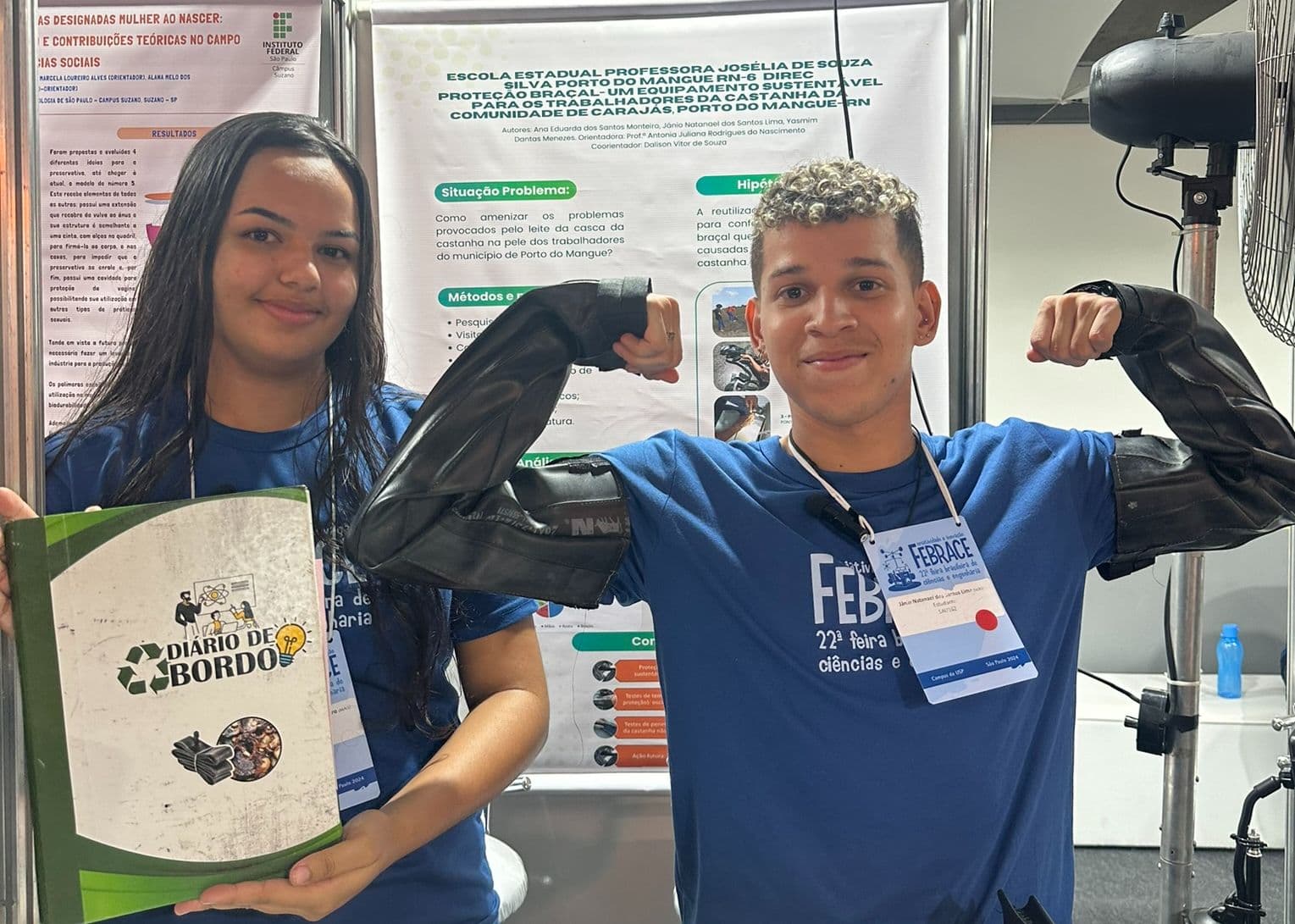
The students who received the honorable mention are now seeking to patent the product. Photo: Maria Carolina Stenico/Circular Movement.
Honorable Mention
As an honorable mention, we have a project that seeks to reuse inner tubes in the manufacturing of arm protections to reduce burns caused by the milk of the cashew nut shell in workers involved in the extraction process. The research is authored by a group from E.E. Prof.a Josélia de Souza Silva, located in Porto do Mangue, also in Rio Grande do Norte, where the activity is widely carried out.
After conducting theoretical research, questionnaires, and visits to workplaces, two versions of the protection were developed and tested, with positive acceptance results from the workers. In addition to benefiting the workers, the reuse of discarded materials also contributes to the environment. The next step involves seeking a patent and commercializing the product.
The Circular Movement ambassador, Prof. Dr. Flávio Ribeiro, emphasizes that "the projects not only identify real, important, and relevant problems but also propose viable, scalable, and creative solutions, with the potential for implementation on a large scale, including by companies."
"The Award For a World Without Waste plays a fundamental role in offering opportunities for the development of these projects and the people involved. I hope that future editions of the award will continue to recognize and promote valuable initiatives throughout the country, many of which could go unnoticed without this recognition," he highlights.
For Maria Carolina Stenico, project manager of the Circular Movement and responsible for the Award for a World Without Waste, she believes that the award at Febrace marks a new phase for the ecosystem itself. "This year, we were excited to see that many students are already familiar with the Circular Movement and eagerly await our evaluation. They want to be recognized by the Award and be on the podium. Additionally, it was gratifying to see a significant increase in the number of projects focused on environmental issues and proposing solutions for them. It is inspiring to see so many young people committed to building a more sustainable and waste-free world!"
This is just one of the stages of the Award for a World Without Waste - originally launched at Febrace in 2021 and with its first international edition held in 2023. The award is an educational initiative of the Circular Movement, in partnership with important Science and Technology fairs throughout Latin America. Throughout 2024, we will learn more and more ideas from students concerned with waste management and the circular economy. Come with us and let's go together for a world without waste.
About Febrace
Febrace is a national program that encourages young people and educators in the field of science and engineering in Brazil. It holds an annual exhibition of scientific and technological projects, providing opportunities for competition and international exposure. Maintained by the Polytechnic School of USP and LSI-TEC, it seeks to promote scientific culture, innovation, and entrepreneurship, with the support of various partners, including CNPq, Unesco, and the US Embassy.
About the Circular Movement
Created in 2020, the Circular Movement is a collaborative ecosystem dedicated to promoting the transition from a linear to a circular economy. The idea that every resource can be reused and transformed is the motto of the Circular Economy, the movement's basic concept. The Circular Movement is an open initiative that promotes collaborative spaces with the aim of informing people and institutions that a waste-free future is possible through education and culture, the adoption of new behaviors, inclusion, and the development of new processes, products, and attitudes. The work counts on the pioneering partnership of Dow, a chemical, plastics, and agricultural products company based in Michigan, United States. The Circular Movement currently impacts 4 million people through its activations and content.
And you? Want to learn more about Circular Economy?
If you are interested in learning more about this topic, access the Circular Academy, the first free Latin American course on Circular Economy aimed at the general public. Together, in partnership and collaboration, we can make a difference in building a more circular planet.
